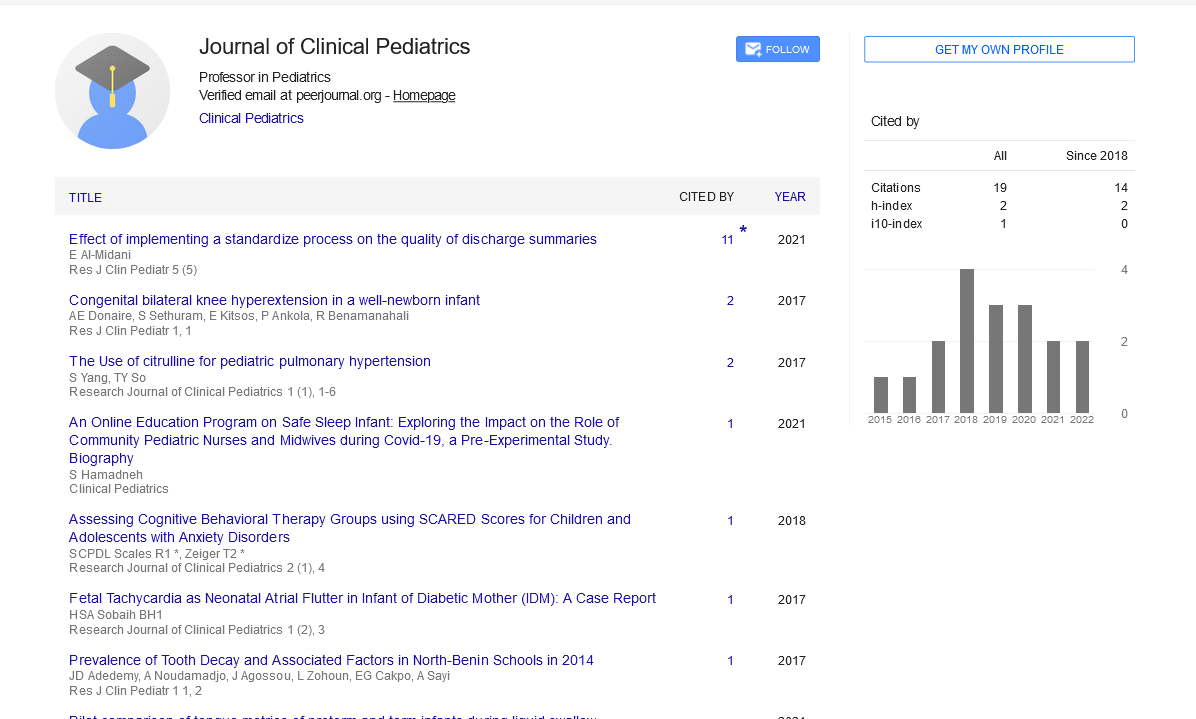Opinion Article, Res J Clin Pediatr Vol: 7 Issue: 3
Evaluating the Impact of Congenital Heart Disease on Pediatric Patients
Frank Rushine*
1Department of Medical and Surgical Sciences, Magna Graecia University Viale, Catanzaro, Italy
*Corresponding Author: Frank Rushine,
Department of Medical and Surgical
Sciences, Magna Graecia University Viale, Catanzaro, Italy
E-mail: frank_rushine@mguv.it
Received date: 23 August, 2023, Manuscript No. RJCP-23-117479;
Editor assigned date: 25 August, 2023, PreQC No. RJCP-23-117479 (PQ);
Reviewed date: 08 September, 2023, QC No. RJCP-23-117479;
Revised date: 15 September, 2023, Manuscript No. RJCP-23-117479 (R);
Published date: 22 September, 2023, DOI: 10.4172/Rjcp.1000156
Citation: Rushine F (2023) Evaluating the Impact of Congenital Heart Disease on Pediatric Patients.Res J Clin Pediatr 7:3.
Description
Congenital Heart Disease (CHD) is a term that encompasses a range of structural heart abnormalities present at birth. It affects approximately 1 in 100 newborns worldwide, making it the most common birth defect. While advances in medical science have improved the diagnosis and treatment of CHD, its impact on pediatric patients remains an essential concern. Children with CHD face a range of physical health challenges. The nature and severity of these challenges vary greatly, depending on the specific heart defect. Some children may have mild symptoms and require minimal intervention, while others may face life-threatening conditions that necessitate complex surgical procedures.
Many children with CHD have limited stamina due to compromised heart function, which can affect their ability to engage in physical activities. Complex CHD often requires repeated hospitalisations for surgeries, interventions, or monitoring, impacting a child's daily life and routine. Children with CHD may need to take multiple medications daily to control symptoms or prevent complications, which can be challenging for both the child and their carers. Some children with CHD may experience growth and developmental delays due to the energy demands on their hearts, leading to smaller stature and cognitive development concerns.
Psychological and emotional impact
The emotional effects of CHD are not limited to its physical challenges. Pediatric patients and their families often face a myriad of psychological and emotional stressors. Children with CHD and their parents may experience anxiety and stress related to the uncertainty of their condition, ongoing medical procedures, and potential long-term complications. Children with visible surgical scars or physical limitations may struggle with body image issues and self-esteem.
Frequent hospitalisations and invasive procedures can lead to a sense of trauma and fear, particularly in younger children who may not fully understand what is happening. Children with CHD may face social isolation due to their condition, which can impact their social development and relationships with peers.
CHD can also affect a child's educational and developmental progress. Frequent absences from school due to medical appointments or hospital stays can disrupt a child's education. Developmental milestones may be delayed due to physical limitations and emotional stressors. Specialized education plans and support are often necessary to help these children reach their full potential.
The impact of CHD extends beyond the pediatric patient; it affects the entire family. Parents often take on the role of carers and advocates, which can be emotionally and financially taxing. Siblings may also experience emotional strain and feelings of neglect when a significant portion of parental attention is directed towards the child with CHD.
To reduce the impact of CHD on pediatric patients and their families, various coping strategies and support systems are essential. Multidisciplinary healthcare teams that include pediatric cardiologists, nurses, social workers, and psychologists work together to provide holistic care. Psychological support for both children and parents is essential to addressing the emotional impact of CHD.
Connecting with other families who have experienced CHD can provide a sense of community, shared experiences, and emotional support. Empowering families with knowledge about their child's condition and advocacy skills can help them navigate the healthcare system effectively.
Conclusion
Congenital heart disease has a profound and complex impact on pediatric patients, extending far beyond the physical health challenges. Addressing the emotional, psychological, social, and developmental aspects is important for the overall well-being of these children. Through a combination of medical advancements and comprehensive support systems, pediatric patients with CHD can lead fulfilling lives, navigate their unique challenges, and achieve their full potential. It's essential for healthcare providers, families, and society as a whole to be aware of these multifaceted effects and work collaboratively to provide the best care and support for children with CHD.
 Spanish
Spanish  Chinese
Chinese  Russian
Russian  German
German  French
French  Japanese
Japanese  Portuguese
Portuguese  Hindi
Hindi 
